Photoautotroph - Study guides, Class notes & Summaries
Looking for the best study guides, study notes and summaries about Photoautotroph? On this page you'll find 268 study documents about Photoautotroph.
Page 3 out of 268 results
Sort by
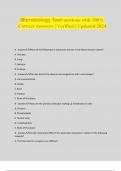
-
Microbiology Test uestions with 100% Correct Answers | Verified | Updated 2024
- Exam (elaborations) • 24 pages • 2024
- Available in package deal
-
- $12.49
- + learn more
Microbiology Test uestions with 100% Correct Answers | Verified | Updated 2024 D - answerWhich of the following is a eukaryotic domain in the three-domain system? A. Archaea B. Fungi C. Bacteria D. Eukarya A - answerWho was the first to observe microorganisms with a microscope? A. van Leeuwenhoek B. Hooke C. Koch D. Pasteur E. None of the above B - answerThese are the primary molecules making up membranes in cells: A. Proteins B. Phospholipids C. Nucleic acids D. Carbohydrates ...
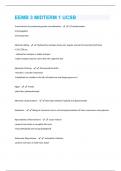
-
EEMB 3 MIDTERM 1 UCSB 2024 LATEST QUESTIONS WITH 100% CORRECT ANSWERS!!
- Exam (elaborations) • 17 pages • 2024
- Available in package deal
-
- $7.99
- + learn more
3 mechanisms for prokaryot genetic recombination - 1.)Transformation 2.)Conjugation 3.)Transduction Absolute dating - -Radioactive isotopes decay over regular annual time periods (half-lives) -C14 5,700 yrs - radioactive isotopes vs stable isotopes -stable isotopes stay the same after the organism dies Alexander Fleming - -Discovered Penicillin -microbe v. microbe interaction -Capitalized on mistake in the lab, left plate out and fungus grew on it Algae - -Protist -plant like; photoau...
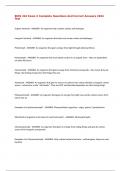
-
BIOS 242 Exam 2 Complete Questions And Correct Answers 2024 Test
- Exam (elaborations) • 13 pages • 2024
-
Available in package deal
-
- $9.99
- + learn more
Organic Nutrient - ANSWER- An organism that contains carbon and hydrogen Inorganic Nutrient - ANSWER- An organism that does not contan carbon and hydrogen Phototroph - ANSWER- An organism that gains energy from light through photosynthesis Heterotroph - ANSWER- An organism that must obtain carbon in an organic form - they are dependent on other life forms Chemotroph - ANSWER- An organism that gains energy from chemical compounds - this means they eat things. Harvesting energy from th...
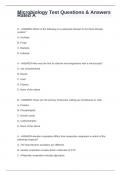
-
Microbiology Test Questions & Answers Rated A
- Exam (elaborations) • 26 pages • 2024
-
- $10.99
- + learn more
B - ANSWER-The major energy storage molecule found in all organisms is A. DNA B. ATP C. NADP D. ADP C - ANSWER-what organism is not correctly matched to its energy source A. photoheterotroph - light B. Chemoheterotroph - Fe2+ C. Photoautotroph - CO2 D. Chemoautotoph - NH3 E. Chemoheterotroph - NH3 A - ANSWER-which metabolic process produces the fewest ATP molecules? A. fermentation B. aerobic respiration C. anaerobic respiration C - ANSWER-Which of the following lists the s...
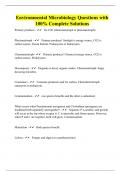
-
Environmental Microbiology Questions with 100% Complete Solutions
- Exam (elaborations) • 6 pages • 2024
-
Available in package deal
-
- $12.99
- + learn more
Primary producer - fix CO2 (chemoautotroph or photoautotroph) Photoautotroph - Primary producer! Sunlight is energy source, CO2 is carbon source. Ocean bottom. Prokaryotes or Eukaryotes. Chemoautotroph - Primary producer! Chemical energy source. CO2 is carbon source. Prokaryotes. Decomposer - Degrade or decay organic matter. Chemoautotroph: fungi, decaying microbes. Consumers - Consume producers and fix carbon. Chemoheterotroph: eukaryote or prokaryote. Commensalism...

-
Microbiology Chapter 5 Exam Questions with 100% Correct Answers | Verified | Updated
- Exam (elaborations) • 10 pages • 2024
- Available in package deal
-
- $12.49
- + learn more
Microbiology Chapter 5 Exam Questions with 100% Correct Answers | Verified | Updated C) Coenzyme A - answerWhich of the following compounds is NOT an enzyme? A) Dehydrogenase B) Cellulase C) Coenzyme A D) β-galactosidase E) Sucrase C) NAD+ - answerWhich compound is being reduced in the reaction shown in Figure 5.1? A) Isocitric acid and α-ketoglutaric acid B) α-ketoglutaric acid and NAD+ C) NAD+ D) NADH E) NADH and isocitric acid B) Photoautotroph — CO2 - answerWhich organism...
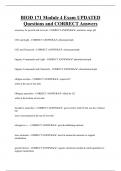
-
BIOD 171 Module 4 Exam UPDATED Questions and CORRECT Answers
- Exam (elaborations) • 5 pages • 2024
-
- $10.49
- + learn more
BIOD 171 Module 4 Exam UPDATED Questions and CORRECT Answers necessary for growth and survival - CORRECT ANSWER- nutrients, temp, pH CO2 and Light - CORRECT ANSWER- photoautotroph CO2 and Chemicals - CORRECT ANSWER- chemoautotroph Organic Compounds and Light - CORRECT ANSWER- photoheterotroph

-
Requirements For Bacterial Growth (Exam 1 Micro) Questions And Answers
- Exam (elaborations) • 7 pages • 2024
- Available in package deal
-
- $12.99
- + learn more
Requirements For Bacterial Growth (Exam 1 Micro) Questions And Answers autotroph - ANS-a nutritional mutant 8 requirements for bacterial growth - ANS-water carbon/ energy sources essential elements and organic g.f temperature pH oxygen CO2 osmotic conditions all nutrients must be dissolved in what to enter the cell? - ANS-water what percent of the cell is water - ANS-70-90 drying inhibits what for organisms - ANS-growth of organisms what to capsules provide the cell with prevention ...

-
BCH 3025 Exam 1 Modules 1-5 Questions and Answers | Latest Version | 2024/2025 | Already Passed
- Exam (elaborations) • 67 pages • 2024
-
- $11.90
- + learn more
BCH 3025 Exam 1 Modules 1-5 Questions and Answers | Latest Version | 2024/2025 | Already Passed **Where is the DNA located in a bacterial cell?** - A) cell envelope. - B) cell membrane. - C) nucleoid. - D) nucleus. - E) ribosomes. **What was a major evolutionary development in eukaryotes compared to prokaryotes?** - A) DNA. - B) photosynthetic capability. - C) plasma membranes. - D) ribosomes. - E) the nucleus. **In eukaryotic cells, what structure encloses the nucleus...

-
BIO 242 Exam 2 Review Questions and Answers
- Exam (elaborations) • 9 pages • 2024
-
Available in package deal
-
- $10.99
- + learn more
Organic Nutrient An organism that contains carbon and hydrogen Inorganic Nutrient An organism that does not contan carbon and hydrogen Phototroph An organism that gains energy from light through photosynthesis Heterotroph An organism that must obtain carbon in an organic form - they are dependent on other life forms Chemotroph An organism that gains energy from chemical compounds - this means they eat things. Harvesting energy from the things they eat. Autotroph An organism that g...

How did he do that? By selling his study resources on Stuvia. Try it yourself! Discover all about earning on Stuvia


